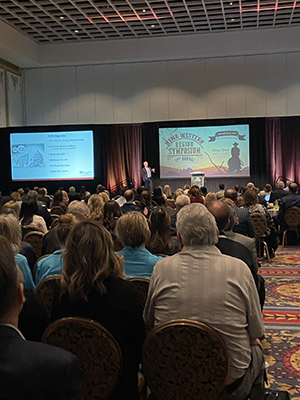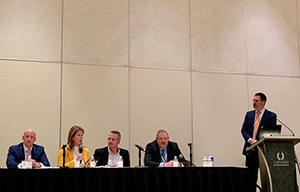HFMA’s Western Region Symposium provides education on customer financial experience and the revenue cycle
The symposium was a joint effort by the Chapters of Region 10: Alaska, California, Hawaii, Nevada, Oregon and Washington and Region 11: Arizona, Colorado, Idaho, Montana, New Mexico, Utah and Wyoming.

Industry challenges and strengths, revenue cycle best practices and the patient financial experience were just a few highlights of the 22nd annual HFMA Western Region Symposium. Held on Jan. 12-15, 2020, at the Paris Las Vegas Hotel and Casino, Regions 10 and 11 brought together a record-setting 948 total attendees who represented hospitals, health plans, physician practices and other healthcare organizations.
Learning from industry thought leaders

Attendees had the opportunity to earn up to 21.5 National Association of State Boards of Accountancy (NASBA) credit hours. Education included six keynote and six general sessions and the following breakout session tracks:
- Critical access hospital (CAH)
- Data analytics
- Revenue cycle
- Strategic planning and reimbursement
- Finance
“This year’s symposium included several inspirational speakers that not only talked of overcoming challenges, but also challenged us as healthcare financial professionals to find balance, purpose and joy in our lives,” said Ben Shah, CEO of Olympia Orthopaedic Associates, an Oregon Chapter Member and Region 11 regional executive. His company is located in the state of Washington.
“The attendees learned what the proposals are and implications of legislative and regulatory changes on surprise billing,” said Terry Brennan, a member of the Arizona Chapter, RE 2 of Region 10. Brennan, who is retired, resides in Prescott, Arizona.
“We also identified ways to advise and influence Washington policymakers,” said Brennan. “[Attendees from] Critical Access Hospitals learned about the legislative changes that affect us, which included the changes to the CAH cost reporting to CMS.”

Revenue cycle best practices
Revenue cycle, which is a trending topic for the healthcare finance industry, was covered in one breakout session. “[We] discussed several best practices, ranging from the role of predictive analytics to the importance of vendor management, but the topic we spent the most time on related to the patient financial experience, and how to improve it,” said revenue cycle panel Moderator Nick Fricano, president and CEO of Healthfuse in Milwaukee, Wisconsin.
The panelists included:
- Brad Cook, chief revenue officer at Presbyterian Healthcare Services in Albuquerque, New Mexico
- Gerilynn Sevenikar, vice president of Sharp HealthCare in San Diego
- Rick Lyman, senior vice president of enterprise revenue cycle management at Memorial Hermann Health System in Houston
- Shaun Ronan, system vice president of revenue operations at Health First in Rockledge, Florida

Fricano noted that each panelist represented hospitals from different markets with challenges and strengths unique to each of the organizations. The discussion, he said, also focused on the importance of educating patients early on about financial expectations and payment options, so they understand that their responsibility to pay more of healthcare’s rising costs is due to high deductible health plans.
“The panelists cited success in first developing a process for explaining charges to patients throughout the process, including pre-service, day-of-service and post-service, and then increasingly leveraging applications, such as payment/patient portals to streamline patient’s access to information and payment options,” said Fricano. “One panelist warned attendees not to rely on apps without first having a clearly defined and established process and messaging for communicating with patients.”
Leading healthcare services, such as the ones the panelists represent, are progressing to create a better patient financial experience to attract and engage their patients as well as to protect their respective organization’s bottom line, added Fricano.
According to panelist Cook, revenue cycle leaders must find ways to reduce cost through increased efficiency as hospitals are faced with increasing pressure on margins.
“Robotic process automation [RPA] is essential to improve efficiency, reduce errors and improve the customer financial experience,” said Cook. “RPA is a tool to support our employees in making their work more meaningful by eliminating repetitive tasks and allowing them to focus on more complex and exciting work.”

Advice for all industry professionals to consider
Fricano and Cook shared several takeaways from the symposium that are of value for anyone working in healthcare finance.
“Understand and leverage your strengths, and when adopting best practices, know that best practices are ‘guideposts,’ not a ‘one-size-fits-all,’” Fricano said.
“Creating an exceptional customer financial experience is an opportunity that all healthcare finance leaders should seek to embrace,” said Cook. “Healthcare finance is an incredibly complex set of processes, and we must continue to look for ways to create simplicity and transparency.”






